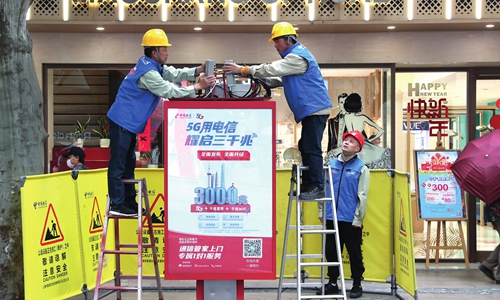Banning Chinese telecoms firms in India may increase local companies’ costs by 20%: insider
Source:Global Times Published: 2020/6/19 15:56:20

Workers from China Telecom install mini 5G base stations at a telephone booth in Shanghai on Friday. The company is expected to install similar 5G equipment in more than 100 telephone booths by the end of the year. China is investing billions of yuan in the field. Photo: AFP
The comments were made after Reuters reported that India has told two state-run telecoms firms to use local rather than Chinese telecoms equipment to upgrade their mobile networks to 4G, citing a senior government source on Thursday.
New Delhi's move comes amid recent border disputes between China and India, and is widely believed to target Chinese telecoms equipment makers Huawei and ZTE.
"Our equipment is cheap and the construction speed is fast, which is hard for our rivals to achieve," independent market watcher Ma Jihua told the Global Times on Friday.
Banning the two companies from entering the Indian market may lead local companies' procurement costs to increase by around 20 percent as suppliers in India produce less, meaning rivals outside of China may increase their prices, Ma added.
India last year announced an almost $8 billion plan, part of which was earmarked for network upgrades to help unprofitable operators Bharat Sanchar Nigam and Mahanagar Telephone Nigam.
Reuters has since reported that plan will be publicly funded and the above-mentioned Chinese operators should try to ensure they buy made-in-India equipment.
Huawei and ZTE could not be reached for comment.
Market insiders said Chinese manufacturers account for about a quarter of the market share in India, and foreign rivals such as Ericsson of Sweden, Nokia of Finland and Samsung of South Korea make up another chunk of the market share as India lacks domestic expertise in telecoms equipment manufacturing.
India still faces challenges in its network construction, although social applications are active.
Mobile phone signal is highly unstable, except for in big cities like Delhi, Mumbai and Bangalore, and sometimes at least two cards from two telecommunications service providers are needed to ensure network speeds, Guo Tao, a Beijing white-collar worker who has been to India several times, told the Global Times on Friday.
Sometimes, I needed to switch manually to different telecoms operators when I used one mobile phone card, as it was possible the current network of one operator worked at one point but was out of service later, he said.
"India should learn from China's network construction, rather than banning [Chinese firms]," he said.
Global Times